#free and open source software
Explore tagged Tumblr posts
Text
Why enshittification happens and how to stop it.
The enshittification of the internet and increasingly the software we use to access it is driven by profit. It happens because corporations are machines for making profits from end users, the users and customers are only seen as sources of profits. Their interests are only considered if it can help the bottom line. It's capitalism.
For social media it's users are mainly seen by the companies that run the sites as a way for getting advertisers to pay money that can profit the shareholders. And social media is in a bit of death spiral right now, since they have seldom or never been profitable and investor money is drying up as they realize this.
So the social media companies. are getting more and more desperate for money. That's why they are getting more aggressive with getting you to watch ads or pay for the privilege of not watching ads. It won't work and tumblr and all the other sites will die eventually.
But it's not just social media companies, it's everything tech-related. It gets worse the more monopolistic a tech giant is. Google is abusing its chrome-based near monopoly over the web, nerfing adblockers, trying to drm the web, you name it. And Microsoft is famously a terrible company, spying on Windows users and selling their data. Again, there is so much money being poured into advertising, at least 493 billion globally, the tech giants want a slice of that massive pie. It's all about making profits for shareholders, people be damned.
And the only insurance against this death spiral is not being run by a corporation. If the software is being developed by a non-profit entity, and it's open source, there is no incentive for the developers to fuck over the users for the sake of profits for shareholders, because there aren't any profits, and no shareholders.
Free and Open source software is an important part of why such software development can stay non-corporate. It allows for volunteers to contribute to the code and makes it harder for users to be secretly be fucked over by hidden code.
Mozilla Firefox and Thunderbird are good examples of this. There is a Mozilla corporation, but it exists only for legal reasons and is a wholly-owned subsidiary of the non-profit Mozilla foundation. There are no shareholders. That means the Mozilla corporation is not really a corporation in the sense that Google is, and as an organization has entirely different incentives. If someone tells you that Mozilla is just another corporation, (which people have said in the notes of posts about firefox on this very site) they are spreading misinformation.
That's why Firefox has resisted the enshittification of the internet so well, it's not profit driven. And people who develop useful plugins that deshitify the web like Ublock origin and Xkit are as a rule not profit-driven corporations.
And you can go on with other examples of non-profit software like Libreoffice and VLC media player, both of which you should use.
And you can go further, use Linux as your computer's operating system.. It's the only way to resist the enshitification that the corporate duopoly of Microsoft and Apple has brought to their operating system. The plethora of community-run non-profit Linux distributions like Debian, Mint and Arch are the way to counteract that, and they will stay resistant to the same forces (creating profit for shareholders) that drove Microsoft to create Windows 11.
Of course not all Linux distributions are non-profits. There are corporate created distros like Red Hat's various distros, Canonical's Ubuntu and Suse's Opensuse, and they prove the point I'm making. There has some degree of enshittification going on with those, red hat going closed source and Canonical with the snap store for example. Mint is by now a succesful community-driven response to deshitify Ubuntu by removing snaps for example, and even they have a back-up plan to use Debian as a base in case Canonical makes Ubuntu unuseable.
As for social media, which I started with, I'm going to stay on tumblr for now, but it will definitely die. The closest thing to a community run non-profit replacement I can see is Mastodon, which I'm on as @[email protected].
You don't have to keep using corporate software, and have it inevitably decline because the corporations that develop it cares more about its profits than you as an end user.
The process of enshittification proves that corporations being profit-driven don't mean they will create a better product, and in fact may cause them to do the opposite. And the existence of great free and open source software, created entirely without the motivation of corporate profits, proves that people don't need to profit in order to help their fellow human beings. It kinda makes you question capitalism.
924 notes
·
View notes
Text
17 notes
·
View notes
Text
i just shifted to libreoffice
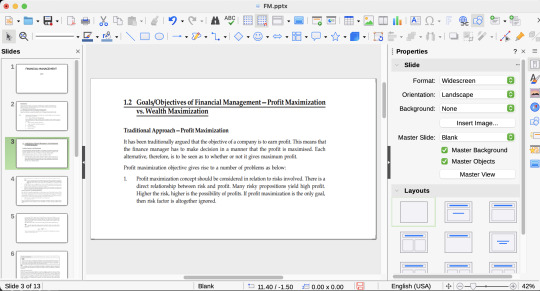
#common foss win#free and open source software#its a pain to open anything with mac alts of ms office
1 note
·
View note
Text
fuck amazon, go ask your local library for that film or show you love/heard about/absolutely need to see or you’ll die. ask if the have hoopla or kanopy. ask about inter-library loan.
Prime’s enshittified advertising
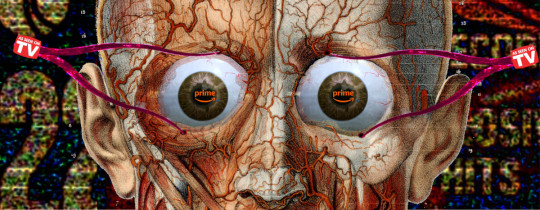
Prime's gonna add more ads. They brought in ads in January, and people didn't cancel their Prime subscriptions, so Amazon figures that they can make Prime even worse and make more money:
https://arstechnica.com/gadgets/2024/10/amazon-prime-video-is-getting-more-ads-next-year/
The cruelty isn't the point. Money is the point. Every ad that Amazon shows you shifts value away from you – your time, your attention – to the company's shareholders.
That's the crux of enshittification. Companies don't enshittify – making their once-useful products monotonically worse – because it amuses them to erode the quality of their offerings. They enshittify them because their products are zero-sum: the things that make them valuable to you (watching videos without ads) make things less valuable to them (because they can't monetize your attention).
This isn't new. The internet has always been dominated by intermediaries – platforms – because there are lots more people who want to use the internet than are capable of building the internet. There's more people who want to write blogs than can make a blogging app. There's more people who want to play and listen to music than can host a music streaming service. There's more people who want to write and read ebooks than want to operate an ebook store or sell an ebooks reader.
Despite all the early internet rhetoric about the glories of disintermediation, intermediaries are good, actually:
https://pluralistic.net/2022/06/12/direct-the-problem-of-middlemen/
The problem isn't with intermediaries per se. The problem arises when intermediaries grow so powerful that they usurp the relationship between the parties they connect. The problem with Uber isn't the use of mobile phones to tell taxis that you're standing on a street somewhere and would like a cab, please. The problem is rampant worker misclassification, regulatory arbitrage, starvation wages, and price-gouging:
https://pluralistic.net/2024/02/29/geometry-hates-uber/#toronto-the-gullible
There's no problem with publishers, distributors, retailers, printers, and all the other parts of the bookselling ecosystem. While there are a few, rare authors who are capable of performing all of these functions – basically gnawing their books out of whole logs with their teeth – most writers can't, and even the ones who can, don't want to:
https://pluralistic.net/2024/02/19/crad-kilodney-was-an-outlier/#intermediation
When early internet boosters spoke of disintermediation, what they mostly meant was that it would be harder for intermediaries to capture those relationships – between sellers and buyers, creators and audiences, workers and customers. As Rebecca Giblin and I wrote in our 2022 book Chokepoint Capitalism, intermediaries in every sector rely on chokepoints, narrows where they can erect tollbooths:
https://chokepointcapitalism.com/
When chokepoints exist, they multiply up and down the supply chain. In the golden age of physical, recorded music, you had several chokepoints that reinforced one another. Limited radio airwaves gave radio stations power over record labels, who had to secretly, illegally bid for prime airspace ("payola"). Retail consolidation – the growth of big record chains – drove consolidation in the distributors who sold to the chains, and the more concentrated distributors became, the more they could squeeze retailers, which drove even more consolidation in record stores. The bigger a label was, the more power it had to shove back against the muscle of the stores and the distributors (and the pressing plants, etc). Consolidation in labels also drove consolidation in talent agencies, whose large client rosters gave them power to resist the squeeze from the labels. Consolidation in venues drives consolidation in ticketing and promotion – and vice-versa.
But there's two parties to this supply chain who can't consolidate: musicians and their fans. With limits on "sectoral bargaining" (where unions can represent workers against all the companies in a sector), musicians' unions were limited in their power against key parts of the supply chain, so the creative workers who made the music were easy pickings for labels, talent reps, promoters, ticketers, venues, retailers, etc. Music fans are diffused and dispersed, and organized fan clubs were usually run by the labels, who weren't about to allow those clubs to be used against the labels.
This is a perfect case-study in the problems of powerful intermediaries, who move from facilitator to parasite, paying workers less while degrading their products, and then charge customers more for those enshittified products.
The excitement about "disintermediation" wasn't so much about eliminating intermediaries as it was about disciplining them. If there were lots of ways to market a product or service, sell it, collect payment for it, and deliver it, then the natural inclination of intermediaries to turn predator would be curbed by the difficulty of corralling their prey into chokepoints.
Now that we're a quarter century on from the Napster Wars, we can see how that worked out. Decades of failure to enforce antitrust law allowed a few companies to effectively capture the internet, buying out rivals who were willing to sell, and bankrupting those who wouldn't with illegal tactics like predatory pricing (think of Uber losing $31 billion by subsidizing $0.41 out of every dollar they charged for taxi rides for more than a decade).
The market power that platforms gained through consolidation translated into political power. When a few companies dominate a sector, they're able to come to agreement on common strategies for dealing with their regulators, and they've got plenty of excess profits to spend on those strategies. First and foremost, platforms used their power to get more power, lobbying for even less antitrust enforcement. Additionally, platforms mobilized gigantic sums to secure the right to screw customers (for example, by making binding arbitration clauses in terms of service enforceable) and workers (think of the $225m Uber and Lyft spent on California's Prop 22, which formalized their worker misclassification swindle).
So big platforms were able to insulate themselves from the risk of competition ("five giant websites, filled with screenshots of the other four" – Tom Eastman), and from regulation. They were also able to expand and mobilize IP law to prevent anyone from breaking their chokepoints or undoing the abuses that these enabled. This is a good place to get specific about how Prime Video works.
There's two ways to get Prime videos: over an app, or in your browser. Both of these streams are encrypted, and that's really important here, because of a law – Section 1201 of the 1998 Digital Millennium Copyright Act – which makes it really illegal to break this kind of encryption (commonly called "Digital Rights Management" or "DRM"). Practically speaking, that means that if a company encrypts its videos, no one is allowed to do anything to those videos, even things that are legal, without the company's permission, because doing all those legal things requires breaking the DRM, and breaking the DRM is a felony (five years in prison, $500k fine, for a first offense).
Copyright law actually gives subscribers to services like Prime a lot of rights, and it empowers businesses that offer tools to exercise those rights. Back in 1976, Sony rolled out the Betamax, the first major home video recorder. After an eight-year court battle, the Supreme Court weighed in on VCRs and ruled that it was legal for all of us to record videos at home, both to watch them later, and to build a library of our favorite shows. They also ruled that it was legal for Sony – and by that time, every other electronics company – to make VHS systems, even if those systems could be used in ways that violated copyright because they were "capable of sustaining a substantial non-infringing use" (letting you tape shows off your TV).
Now, this was more than a decade before the DMCA – and its prohibition on breaking DRM – passed, but even after the DMCA came into effect, there was a lot of media that didn't have DRM, so a new generation of tech companies were able to make tools that were "capable of sustaining a substantial non-infringing use" and that didn't have to break any DRM to do it.
Think of the Ipod and Itunes, which, together, were sold as a way to rip CDs (which weren't encrypted), and play them back from both your desktop computer and a wildly successful pocket-sized portable device. Itunes even let you stream from one computer to another. The record industry hated this, but they couldn't do anything about it, thanks to the Supreme Court's Betamax ruling.
Indeed, they eventually swallowed their bile and started selling their products through the Itunes Music Store. These tracks had DRM and were thus permanently locked to Apple's ecosystem, and Apple immediately used that power to squeeze the labels, who decided they didn't like DRM after all, and licensed all those same tracks to Amazon's DRM-free MP3 store, whose slogan was "DRM: Don't Restrict Me":
https://memex.craphound.com/2008/02/01/amazons-anti-drm-tee/
Apple played a funny double role here. In marketing Itunes/Ipods ("Rip, Mix, Burn"), they were the world's biggest cheerleaders for all the things you were allowed to do with copyrighted works, even when the copyright holder objected. But with the Itunes Music Store and its mandatory DRM, the company was also one of the world's biggest cheerleaders for wrapping copyrighted works in a thin skin of IP that would allow copyright holders to shut down products like the Ipod and Itunes.
Microsoft, predictably enough, focused on the "lock everything to our platform" strategy. Then-CEO Steve Ballmer went on record calling every Ipod owner a "thief" and arguing that every record company should wrap music in Microsoft's Zune DRM, which would allow them to restrict anything they didn't like, even if copyright allowed it (and would also give Microsoft the same abusive leverage over labels that they famously exercised over Windows software companies):
https://web.archive.org/web/20050113051129/http://management.silicon.com/itpro/0,39024675,39124642,00.htm
In the end, Amazon's approach won. Apple dropped DRM, and Microsoft retired the Zune and shut down its DRM servers, screwing anyone who'd ever bought a Zune track by rendering that music permanently unplayable.
Around the same time as all this was going on, another company was making history by making uses of copyrighted works that the law allowed, but which the copyright holders hated. That company was Tivo, who products did for personal video recorders (PVRs) what Apple's Ipod did for digital portable music players. With a Tivo, you could record any show over cable (which was too expensive and complicated to encrypt) and terrestrial broadcast (which is illegal to encrypt, since those are the public's airwaves, on loan to the TV stations).
That meant that you could record any show, and keep it forever. What's more, you could very easily skip through ads (and rival players quickly emerged that did automatic ad-skipping). All of this was legal, but of course the cable companies and broadcasters hated it. Like Ballmer, TV execs called Tivo owners "thieves."
But Tivo didn't usher in the ad-supported TV apocalypse that furious, spittle-flecked industry reps insisted it would. Rather, it disciplined the TV and cable operators. Tivo owners actually sought out ads that were funny and well-made enough to go viral. Meanwhile, every time the industry decided to increase the amount of advertising in a show, they also increased the likelihood that their viewers would seek out a Tivo, or worse, one of those auto-ad-skipping PVRs.
Given all the stink that TV execs raised over PVRs, you'd think that these represented a novel threat. But in fact, the TV industry's appetite for ads had been disciplined by viewers' access to new technology since 1956, when the first TV remotes appeared on the market (executives declared that anyone who changed the channel during an ad-break was a thief). Then came the mute button. Then the wireless remote. Meanwhile, a common VCR use-case – raised in the Supreme Court case – was fast-forwarding ads.
At each stage, TV adapted. Ads in TV shows represented a kind of offer: "Will you watch this many of these ads in return for a free TV show?" And the remote, the mute button, the wireless remote, the VCR, the PVR, and the ad-skipping PVR all represented a counter-offer. As economists would put it, the ability of viewers to make these counteroffers "shifted the equilibrium." If viewers had no defensive technology, they might tolerate more ads, but once they were able to enforce their preferences with technology, the industry couldn't enshittify its product to the liminal cusp of "so many ads that the viewer is right on the brink of turning off the TV (but not quite)."
This is the same equilibrium-shifting dynamic that we see on the open web, where more than 50% of users have installed an ad-blocker. The industry says, "Will you allow this many 'sign up to our mailing list' interrupters, pop ups, pop unders, autoplaying videos and other stuff that users hate but shareholders benefit from" and the ad-blocker makes a counteroffer: "How about 'nah?'":
https://www.eff.org/deeplinks/2019/07/adblocking-how-about-nah
TV remotes, PVRs and ad-blockers are all examples of "adversarial interoperability" – a new product that plugs into an existing one, extending or modifying its functions without permission from (or even over the objections of) the original manufacturer:
https://www.eff.org/deeplinks/2019/10/adversarial-interoperability
Adversarial interop creates a powerful disciplining force on platform owners. Once a user grows so frustrated with a product's enshittification that they research, seek out, acquire and learn to use an adversarial interop tool, it's really game over. The printer owner who figures out where to get third-party ink is gone forever. Every time a company like HP raises its prices, they have to account for the number of customers who will finally figure out how to use generic ink and never, ever send another cent to HP.
This is where DMCA 1201 comes into play. Once a product is skinned with DRM, its manufacturers gain the right to prevent you from doing legal things, and can use the public's courts and law-enforcement apparatus to punish you for trying. Take HP: as soon as they started adding DRM to their cartridges, they gained the legal power to shut down companies that cloned, refilled or remanufactured their cartridges, and started raising the price of ink – which today sits at more than $10,000/gallon:
https://pluralistic.net/2024/09/30/life-finds-a-way/#ink-stained-wretches
Using third party ink in your printer isn't illegal (it's your printer, right?). But making third party ink for your printer becomes illegal once you have to break DRM to do so, and so HP gets to transform tinted water into literally the most expensive fluid on Earth. The ink you use to print your kid's homework costs more than vintage Veuve Cliquot or sperm from a Kentucky Derby-winning thoroughbred.
Adversarial interoperability is a powerful tool for shifting the equilibrium between producers, intermediaries and buyers. DRM is an even more powerful way of wrenching that equilibrium back towards the intermediary, reducing the share that buyers and sellers are able to eke out of the transaction.
Prime Video, of course, is delivered via an app, which means it has DRM. That means that subscribers don't get to exercise the rights afforded to them by copyright – only the rights that Amazon permits them to have. There's no Tivo for Prime, because it would have to break the DRM to record the shows you stream from Prime. That allows Prime to pull all kinds of shady shit. For example, every year around this time, Amazon pulls popular Christmas movies from its free-to-watch tier and moves them into pay-per-view, only restoring them in the spring:
https://www.reddit.com/r/vudu/comments/1bpzanx/looks_like_amazon_removed_the_free_titles_from/
And of course, Prime sticks ads in its videos. You can't skip these ads – not because it's technically challenging to make a 30-second advance button for a video stream, and doing so wouldn't violate anyone's copyright – but because Amazon doesn't permit you to do so, and the fact that the video is wrapped in DRM makes it a felony to even try.
This means that Amazon gets to seek a different equilibrium than TV companies have had to accept since 1956 and the invention of the TV remote. Amazon doesn't have to limit the quantity, volume, and invasiveness of its ads to "less the amount that would drive our subscribers to install and use an ad-skipping plugin." Instead, they can shoot for the much more lucrative equilibrium of "so obnoxious that the viewer is almost ready to cancel their subscription (but not quite)."
That's pretty much exactly how Kelly Day, the Amazon exec in charge of Prime Video, put it to the Financial Times: they're increasing the number of ads because "we haven’t really seen a groundswell of people churning out or cancelling":
https://www.ft.com/content/f8112991-820c-4e09-bcf4-23b5e0f190a5
At this point, attentive readers might be asking themselves, "Doesn't Amazon have to worry about Prime viewers who watch in their browsers?" After all browsers are built on open standards, and anyone can make one, so there should be browsers that can auto-skip Prime ads, right?
Wrong, alas. Back in 2017, the W3C – the organization that makes the most important browser standards – caved to pressure from the entertainment industry and the largest browser companies and created "Encrypted Media Extensions" (EME), a "standard" for video DRM that blocks all adversarial interoperability:
https://www.eff.org/deeplinks/2017/09/open-letter-w3c-director-ceo-team-and-membership
This had the almost immediate effect of making it impossible to create an independent browser without licensing proprietary tech from Google – now a convicted monopolist! – who won't give you a license if you implement recording, ad-skipping, or any other legal (but dispreferred) feature:
https://blog.samuelmaddock.com/posts/the-end-of-indie-web-browsers/
This means that for Amazon, there's no way to shift value away from the platform to you. The company has locked you in, and has locked out anyone who might offer you a better deal. Companies that know you are technologically defenseless are endlessly inventive in finding ways to make things worse for you to make things better for them. Take Youtube, another DRM-video-serving platform that has jacked up the number of ads you have to sit through in order to watch a video �� even as they slash payments to performers. They've got a new move: they're gonna start showing you ads while your video is paused:
https://www.usatoday.com/story/money/2024/09/20/youtube-pause-ads-rollout/75306204007/
That is the kind of fuckery you only come up with when your victory condition is "a service that's almost so bad our customers quit (but not quite)."
In Amazon's case, the math is even worse. After all, Youtube may have near-total market dominance over a certain segment of the video market, but Prime Video is bundled with Prime Delivery, which the vast majority of US households subscribe to. You have to give up a lot to cancel your Prime subscription – especially since Amazon's predatory pricing devastated the rest of the retail sector:
https://pluralistic.net/2022/11/28/enshittification/#relentless-payola
Amazon's founding principle was "customer obsession." Ex-Amazoners tell me that this was more than an empty platitude: arguments over product design were won or lost based on whether they could satisfy the "customer obsession" litmus test. Now, everyone falls short of their ideals, but sticking to your ideals isn't merely a matter of internal discipline, of willpower. Living up to your ideals is a matter of external discipline, too. When Amazon no longer had to contend with competitors or regulators, when it was able to use DRM to control its customers and use the law to prevent them from using its products in legal ways, it lost those external sources of discipline.
Amazon suppliers have long complained of the company's high-handed treatment of the vendors who supplied it with goods. Its workers have complained bitterly and loudly about the dangerous and oppressive conditions in its warehouses and delivery vans. But Amazon's customers have consistently given Amazon high marks on quality and trustworthiness.
The reason Amazon treated its workers and suppliers badly and its customers well wasn't that it liked customers and hated workers and suppliers. Amazon was engaged in a cold-blooded calculus: it understood that treating customers well would give it control over those customers, and that this would translate market power to retain suppliers even as it ripped them off and screwed them over.
But now, Amazon has clearly concluded that it no longer needs to keep customers happy in order to retain them. Instead, it's shooting for "keeping customers so angry that they're almost ready to take their business elsewhere (but not quite)." You see this in the steady decline of Amazon product search, which preferences the products that pay the biggest bribes for search placement over the best matches:
https://pluralistic.net/2023/11/06/attention-rents/#consumer-welfare-queens
And you see it in the steady enshittification of Prime Video. Amazon's character never changed. The company always had a predatory side. But now that monopoly and IP law have insulated it from consequences for its actions, there's no longer any reason to keep the predator in check.

Tor Books as just published two new, free LITTLE BROTHER stories: VIGILANT, about creepy surveillance in distance education; and SPILL, about oil pipelines and indigenous landback.


If you'd like an essay-formatted version of this post to read or share, here's a link to it on pluralistic.net, my surveillance-free, ad-free, tracker-free blog:
https://pluralistic.net/2024/10/03/mother-may-i/#minmax
#apropos of absolutely nothing#did you know that programmes like MakeMKV and HandBreak are free and open source software?#and they are perfectly legal to own and use just like a VCR????#not that you should draw your own conclusions about anything i’ve just said#buy physical media#rip it for your personal collection#support your local library#libraries#F.O.S.S#foss#free and open source software#makemkv#handbreak
769 notes
·
View notes
Text
I love free and open source software. All my homies love free and open source software.
1 note
·
View note
Text
If you are willing to entertain the idea that capitalism works or could work then you need to throw out the ridiculous assumption that the reason it works is competition. It's a little weird to me how rarely I've seen this brought up. Capitalism works because of choice. Competition is one way to create choice but it doesn't always and when it doesn't it's harmful. Even when competition can create choice, that doesn't mean that it's the best way to create choice for a particular situation. Sometimes cooperation creates choice better.
Most folks who love capitalism claim to love democracy. (Sometimes to the point where they think they're synonymous.) Democracy works because of choice. Not competition.
It's pretty surprising that my fellow tech bros haven't realized this. The backbone of the entire software industry is Free and Open Source Software (FOSS). Every programmer past CS 101 depends on FOSS to create new apps and libraries. The most popular software license is the MIT license, which is a permissive open source license. By providing the free ability to use, copy, and modify software libraries it provides lots of choices for developers, while remaining completely free (libre). It's not through capitalist competition to sell things at the highest price the market will allow.
Focusing on competition rather than choice means that people who have less choices get left out of the benefits of capitalism. It's a little hard to behave in your own rational self-interest to maximize marginal benefit when you live in a food desert and having a felony on your record limits your job options and redlining has cut you off from moving to a better neighborhood. Maybe a strong social safety net is against the letter of capitalism, but it does help provide the true benefit of capitalism: choice.
#Capitalism#Capitalist reform#Competition#Cooperation#Democracy#codeblr#progblr#Foss#Free and open source software#social safety net#Cant decide whether to be a social democrat or a democratic socialist#Maybe the people who cant tell the difference are onto something /s
0 notes
Text
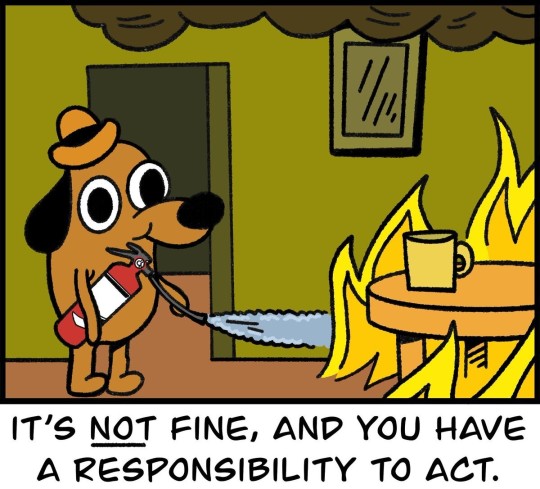
join the praxis discord - sign up - github
#meme#memes#leftist memes#leftblr#open source#praxis#free software#typescript#nodejs#foss#reactjs#design#software#programming
2K notes
·
View notes
Text
traffic cone cosplay

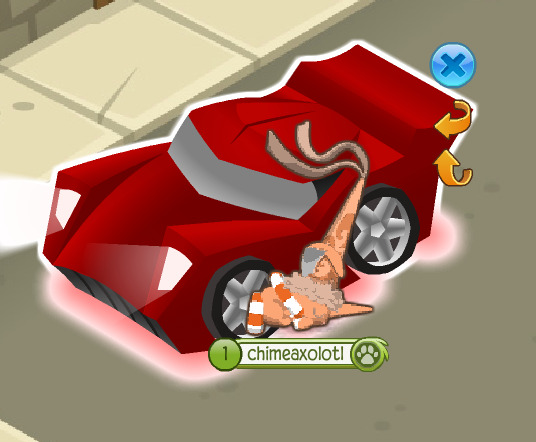
(he got hit by a car)
#for the record “traffic cone” is not a fictional character from a fandom or anything#im just actually dressed as a real traffic cone. like from real life.#actually i guess this could be a... vlc media player cosplay?#sure that works#new animal jam fashion show theme just dropped: free/libre open source software#animal jam#animal jam classic#aj classic#jamblr
134 notes
·
View notes
Text
Tux Paint is 23 today!

33 notes
·
View notes
Text
youtube
I watched this documentary last night, it's five years old but still relevant. I watched the German version that aired on mainstream public tv in Germany in 2018, but apparently there is a professionally made English version that has been uploaded to youtube, which is nice.
It's about how Microsoft has a practical computer OS monopoly, and how that impacts the public sector in Europe specifically. In europe practically all government computers run Windows, and the negative effects of that. How is the data of citizens protected when the code for Windows is closed-source and can't be openly vetted? Especially when US government agencies like NSA has hidden backdoors into Windows. Backdoorss that are also easily abused by other actors, as the then recent WannaCry ransomware incident proves.
We can't tell because transparency is put out of effect when governments run proprietary closed source and Microsoft can claim "trade secrets" to keep the terms of their contracts with governments hidden. And Microsoft has used their monopolistic powers to embed itself into governments and has heavy lobbying for their products to be used. EU government procurement laws are basically non-existent when it comes to operating systems for government computers, Microsoft is the only candidate considered including by the European commission. And when someone doesn't choose Windows, like how Munich choose to use Linux for their computers in the Limux project, Microsoft used lobbying tactics and political corruption to force them to switch back to Windows.
And it is largely things I already knew, but it's nice to see a mainstream documentary talk about these issues. It's a well-made film, it gives an accessible explanation of the difference between proprietary software and open source, why the Microsoft monopoly is a problem and creates corruption, and that alternatives like Linux and Libreoffice exist. It's nothing radical, but like it's a genuine problem that needs to be discussed more.
17 notes
·
View notes
Note
FOSS ftw!!
Nvm! Slow I scrolled down you mentioned krita (X_X)
that’s my bad!
Yes! Krita is a free software with a decent feature to mess around
151 notes
·
View notes
Text
#tumblr polls#best thing ever#tournament poll#the tumblr anonymous ask function#free and open source software
9 notes
·
View notes
Note
Aro culture is, when forced to buy a Google phone cuz that's all you can afford, trying your damnest to use the invasive advert tracking to your advantage.
i.e. periodically typing in "I'm aromantic" to the chrome search bar & loudly saying it into the phone speaker in the hopes you'll stop getting jump-scared by an influx of dating app ads when forced to watch them in mobile games
,,, please. i beg of you. do not. for one, google doesn't recognize that as a metric, at best it places you into a queer category and targets you with ads that are promoted to queer people. They do not bother with granularity, because the advertisers are who are paying for categories or lack thereof. they also probably categorize you as single when you do that stuff, which again, defeats your goal. if you want to tell advertisers to get out here's actually a pretty simple thing to look for:
from there, consider:
install the firefox app (free), and use the uBlock Origin extension (best adblocker, free... and still works on youtube and twitch if you use the firefox app to load them)
i also recommend the breezewiki extension (free), because fandom wiki sucks on an ethics level, and this directs you to an identical, but ad-less page so they don't get money from you.
anyways my solution is stop seeing ads lol
related: install bitwarden as a password manager. it's free, well-established and credible, and you can use it on both android apps and firefox (as an extension) (also on any device in general). you only ever have to remember one password, preferably new, ever again. it's got the rest for you, stupidly well encrypted, and you can store data like security question answers, secure notes, and more!)
#aro culture is#aro#aromantic#actually aro#actually aromantic#ask#mod axel#... look fun fact FOSS (free and open source software) is GREAT a lot of the time#because open source = other people who know things look through it and can tell you if it's actually safe and what it's collecting about yo#and um. look i'm not gonna lie you sent this to someone who likes tech and hates big ads
91 notes
·
View notes
Text
Cleantech has an enshittification problem

On July 14, I'm giving the closing keynote for the fifteenth HACKERS ON PLANET EARTH, in QUEENS, NY. Happy Bastille Day! On July 20, I'm appearing in CHICAGO at Exile in Bookville.

EVs won't save the planet. Ultimately, the material bill for billions of individual vehicles and the unavoidable geometry of more cars-more traffic-more roads-greater distances-more cars dictate that the future of our cities and planet requires public transit – lots of it.
But no matter how much public transit we install, there's always going to be some personal vehicles on the road, and not just bikes, ebikes and scooters. Between deliveries, accessibility, and stubbornly low-density regions, there's going to be a lot of cars, vans and trucks on the road for the foreseeable future, and these should be electric.
Beyond that irreducible minimum of personal vehicles, there's the fact that individuals can't install their own public transit system; in places that lack the political will or means to create working transit, EVs are a way for people to significantly reduce their personal emissions.
In policy circles, EV adoption is treated as a logistical and financial issue, so governments have focused on making EVs affordable and increasing the density of charging stations. As an EV owner, I can affirm that affordability and logistics were important concerns when we were shopping for a car.
But there's a third EV problem that is almost entirely off policy radar: enshittification.
An EV is a rolling computer in a fancy case with a squishy person inside of it. While this can sound scary, there are lots of cool implications for this. For example, your EV could download your local power company's tariff schedule and preferentially charge itself when the rates are lowest; they could also coordinate with the utility to reduce charging when loads are peaking. You can start them with your phone. Your repair technician can run extensive remote diagnostics on them and help you solve many problems from the road. New features can be delivered over the air.
That's just for starters, but there's so much more in the future. After all, the signal virtue of a digital computer is its flexibility. The only computer we know how to make is the Turing complete, universal, Von Neumann machine, which can run every valid program. If a feature is computationally tractable – from automated parallel parking to advanced collision prevention – it can run on a car.
The problem is that this digital flexibility presents a moral hazard to EV manufacturers. EVs are designed to make any kind of unauthorized, owner-selected modification into an IP rights violation ("IP" in this case is "any law that lets me control the conduct of my customers or competitors"):
https://locusmag.com/2020/09/cory-doctorow-ip/
EVs are also designed so that the manufacturer can unilaterally exert control over them or alter their operation. EVs – even more than conventional vehicles – are designed to be remotely killswitched in order to help manufacturers and dealers pressure people into paying their car notes on time:
https://pluralistic.net/2023/07/24/rent-to-pwn/#kitt-is-a-demon
Manufacturers can reach into your car and change how much of your battery you can access:
https://pluralistic.net/2023/07/28/edison-not-tesla/#demon-haunted-world
They can lock your car and have it send its location to a repo man, then greet him by blinking its lights, honking its horn, and pulling out of its parking space:
https://tiremeetsroad.com/2021/03/18/tesla-allegedly-remotely-unlocks-model-3-owners-car-uses-smart-summon-to-help-repo-agent/
And of course, they can detect when you've asked independent mechanic to service your car and then punish you by degrading its functionality:
https://www.repairerdrivennews.com/2024/06/26/two-of-eight-claims-in-tesla-anti-trust-lawsuit-will-move-forward/
This is "twiddling" – unilaterally and irreversibly altering the functionality of a product or service, secure in the knowledge that IP law will prevent anyone from twiddling back by restoring the gadget to a preferred configuration:
https://pluralistic.net/2023/02/19/twiddler/
The thing is, for an EV, twiddling is the best case scenario. As bad as it is for the company that made your EV to change how it works whenever they feel like picking your pocket, that's infinitely preferable to the manufacturer going bankrupt and bricking your car.
That's what just happened to owners of Fisker EVs, cars that cost $40-70k. Cars are long-term purchases. An EV should last 12-20 years, or even longer if you pay to swap the battery pack. Fisker was founded in 2016 and shipped its first Ocean SUV in 2023. The company is now bankrupt:
https://insideevs.com/news/723669/fisker-inc-bankruptcy-chapter-11-official/
Fisker called its vehicles "software-based cars" and they weren't kidding. Without continuous software updates and server access, those Fisker Ocean SUVs are turning into bricks. What's more, the company designed the car from the ground up to make any kind of independent service and support into a felony, by wrapping the whole thing in overlapping layers of IP. That means that no one can step in with a module that jailbreaks the Fisker and drops in an alternative firmware that will keep the fleet rolling.
This is the third EV risk – not just finance, not just charger infrastructure, but the possibility that any whizzy, cool new EV company will go bust and brick your $70k cleantech investment, irreversibly transforming your car into 5,500 lb worth of e-waste.
This confers a huge advantage onto the big automakers like VW, Kia, Ford, etc. Tesla gets a pass, too, because it achieved critical mass before people started to wise up to the risk of twiddling and bricking. If you're making a serious investment in a product you expect to use for 20 years, are you really gonna buy it from a two-year old startup with six months' capital in the bank?
The incumbency advantage here means that the big automakers won't have any reason to sink a lot of money into R&D, because they won't have to worry about hungry startups with cool new ideas eating their lunches. They can maintain the cozy cartel that has seen cars stagnate for decades, with the majority of "innovation" taking the form of shitty, extractive and ill-starred ideas like touchscreen controls and an accelerator pedal that you have to rent by the month:
https://www.theverge.com/2022/11/23/23474969/mercedes-car-subscription-faster-acceleration-feature-price
Put that way, it's clear that this isn't an EV problem, it's a cleantech problem. Cleantech has all the problems of EVs: it requires a large capital expenditure, it will be "smart," and it is expected to last for decades. That's rooftop solar, heat-pumps, smart thermostat sensor arrays, and home storage batteries.
And just as with EVs, policymakers have focused on infrastructure and affordability without paying any attention to the enshittification risks. Your rooftop solar will likely be controlled via a Solaredge box – a terrible technology that stops working if it can't reach the internet for a protracted period (that's right, your home solar stops working if the grid fails!).
I found this out the hard way during the covid lockdowns, when Solaredge terminated its 3G cellular contract and notified me that I would have to replace the modem in my system or it would stop working. This was at the height of the supply-chain crisis and there was a long waiting list for any replacement modems, with wifi cards (that used your home internet rather than a cellular connection) completely sold out for most of a year.
There are good reasons to connect rooftop solar arrays to the internet – it's not just so that Solaredge can enshittify my service. Solar arrays that coordinate with the grid can make it much easier and safer to manage a grid that was designed for centralized power production and is being retrofitted for distributed generation, one roof at a time.
But when the imperatives of extraction and efficiency go to war, extraction always wins. After all, the Solaredge system is already in place and solar installers are largely ignorant of, and indifferent to, the reasons that a homeowner might want to directly control and monitor their system via local controls that don't roundtrip through the cloud.
Somewhere in the hindbrain of any prospective solar purchaser is the experience with bricked and enshittified "smart" gadgets, and the knowledge that anything they buy from a cool startup with lots of great ideas for improving production, monitoring, and/or costs poses the risk of having your 20 year investment bricked after just a few years – and, thanks to the extractive imperative, no one will be able to step in and restore your ex-solar array to good working order.
I make the majority of my living from books, which means that my pay is very "lumpy" – I get large sums when I publish a book and very little in between. For many years, I've used these payments to make big purchases, rather than financing them over long periods where I can't predict my income. We've used my book payments to put in solar, then an induction stove, then a battery. We used one to buy out the lease on our EV. And just a month ago, we used the money from my upcoming Enshittification book to put in a heat pump (with enough left over to pay for a pair of long-overdue cataract surgeries, scheduled for the fall).
When we started shopping for heat pumps, it was clear that this was a very exciting sector. First of all, heat pumps are kind of magic, so efficient and effective it's almost surreal. But beyond the basic tech – which has been around since the late 1940s – there is a vast ferment of cool digital features coming from exciting and innovative startups.
By nature, I'm the kid of person who likes these digital features. I started out as a computer programmer, and while I haven't written production code since the previous millennium, I've been in and around the tech industry for my whole adult life. But when it came time to buy a heat-pump – an investment that I expected to last for 20 years or more – there was no way I was going to buy one of these cool new digitally enhanced pumps, no matter how much the reviewers loved them. Sure, they'd work well, but it's precisely because I'm so knowledgeable about high tech that I could see that they would fail very, very badly.
You may think EVs are bullshit, and they are – though there will always be room for some personal vehicles, and it's better for people in transit deserts to drive EVs than gas-guzzlers. You may think rooftop solar is a dead-end and be all-in on utility scale solar (I think we need both, especially given the grid-disrupting extreme climate events on our horizon). But there's still a wide range of cleantech – induction tops, heat pumps, smart thermostats – that are capital intensive, have a long duty cycle, and have good reasons to be digitized and networked.
Take home storage batteries: your utility can push its rate card to your battery every time they change their prices, and your battery can use that information to decide when to let your house tap into the grid, and when to switch over to powering your home with the solar you've stored up during the day. This is a very old and proven pattern in tech: the old Fidonet BBS network used a version of this, with each BBS timing its calls to other nodes to coincide with the cheapest long-distance rates, so that messages for distant systems could be passed on:
https://en.wikipedia.org/wiki/FidoNet
Cleantech is a very dynamic sector, even if its triumphs are largely unheralded. There's a quiet revolution underway in generation, storage and transmission of renewable power, and a complimentary revolution in power-consumption in vehicles and homes:
https://pluralistic.net/2024/06/12/s-curve/#anything-that-cant-go-on-forever-eventually-stops
But cleantech is too important to leave to the incumbents, who are addicted to enshittification and planned obsolescence. These giant, financialized firms lack the discipline and culture to make products that have the features – and cost savings – to make them appealing to the very wide range of buyers who must transition as soon as possible, for the sake of the very planet.
It's not enough for our policymakers to focus on financing and infrastructure barriers to cleantech adoption. We also need a policy-level response to enshittification.
Ideally, every cleantech device would be designed so that it was impossible to enshittify – which would also make it impossible to brick:
Based on free software (best), or with source code escrowed with a trustee who must release the code if the company enters administration (distant second-best);
All patents in a royalty-free patent-pool (best); or in a trust that will release them into a royalty-free pool if the company enters administration (distant second-best);
No parts-pairing or other DRM permitted (best); or with parts-pairing utilities available to all parties on a reasonable and non-discriminatory basis (distant second-best);
All diagnostic and error codes in the public domain, with all codes in the clear within the device (best); or with decoding utilities available on demand to all comers on a reasonable and non-discriminatory basis (distant second-best).
There's an obvious business objection to this: it will reduce investment in innovative cleantech because investors will perceive these restrictions as limits on the expected profits of their portfolio companies. It's true: these measures are designed to prevent rent-extraction and other enshittificatory practices by cleantech companies, and to the extent that investors are counting on enshittification rents, this might prevent them from investing.
But that has to be balanced against the way that a general prohibition on enshittificatory practices will inspire consumer confidence in innovative and novel cleantech products, because buyers will know that their investments will be protected over the whole expected lifespan of the product, even if the startup goes bust (nearly every startup goes bust). These measures mean that a company with a cool product will have a much larger customer-base to sell to. Those additional sales more than offset the loss of expected revenue from cheating and screwing your customers by twiddling them to death.
There's also an obvious legal objection to this: creating these policies will require a huge amount of action from Congress and the executive branch, a whole whack of new rules and laws to make them happen, and each will attract court-challenges.
That's also true, though it shouldn't stop us from trying to get legal reforms. As a matter of public policy, it's terrible and fucked up that companies can enshittify the things we buy and leave us with no remedy.
However, we don't have to wait for legal reform to make this work. We can take a shortcut with procurement – the things governments buy with public money. The feds, the states and localities buy a lot of cleantech: for public facilities, for public housing, for public use. Prudent public policy dictates that governments should refuse to buy any tech unless it is designed to be enshittification-resistant.
This is an old and honorable tradition in policymaking. Lincoln insisted that the rifles he bought for the Union Army come with interoperable tooling and ammo, for obvious reasons. No one wants to be the Commander in Chief who shows up on the battlefield and says, "Sorry, boys, war's postponed, our sole supplier decided to stop making ammunition."
By creating a market for enshittification-proof cleantech, governments can ensure that the public always has the option of buying an EV that can't be bricked even if the maker goes bust, a heat-pump whose digital features can be replaced or maintained by a third party of your choosing, a solar controller that coordinates with the grid in ways that serve their owners – not the manufacturers' shareholders.
We're going to have to change a lot to survive the coming years. Sure, there's a lot of scary ways that things can go wrong, but there's plenty about our world that should change, and plenty of ways those changes could be for the better. It's not enough for policymakers to focus on ensuring that we can afford to buy whatever badly thought-through, extractive tech the biggest companies want to foist on us – we also need a focus on making cleantech fit for purpose, truly smart, reliable and resilient.

Support me this summer on the Clarion Write-A-Thon and help raise money for the Clarion Science Fiction and Fantasy Writers' Workshop!

If you'd like an essay-formatted version of this post to read or share, here's a link to it on pluralistic.net, my surveillance-free, ad-free, tracker-free blog:
https://pluralistic.net/2024/06/26/unplanned-obsolescence/#better-micetraps

Image: 臺灣古寫真上色 (modified) https://commons.wikimedia.org/wiki/File:Raid_on_Kagi_City_1945.jpg
Grendelkhan (modified) https://commons.wikimedia.org/wiki/File:Ground_mounted_solar_panels.gk.jpg
CC BY-SA 4.0 https://creativecommons.org/licenses/by-sa/4.0/deed.en
#pluralistic#procurement#cleantech#evs#solar#solarpunk#policy#copyfight#copyright#felony contempt of business model#floss#free software#open source#oss#dmca 1201#interoperability#adversarial interoperability#solarization#electrification#enshittification#innovation#incumbency#climate#climate emergency
433 notes
·
View notes
Text
the current status of FLOSS
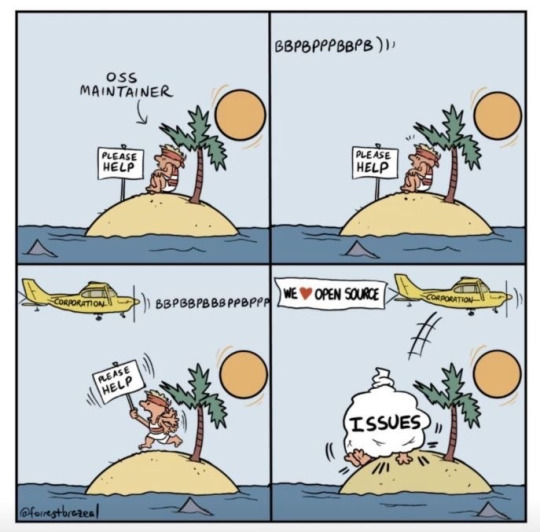
108 notes
·
View notes
Text
Good news!
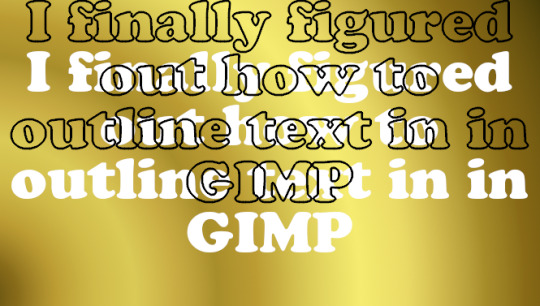
36 notes
·
View notes